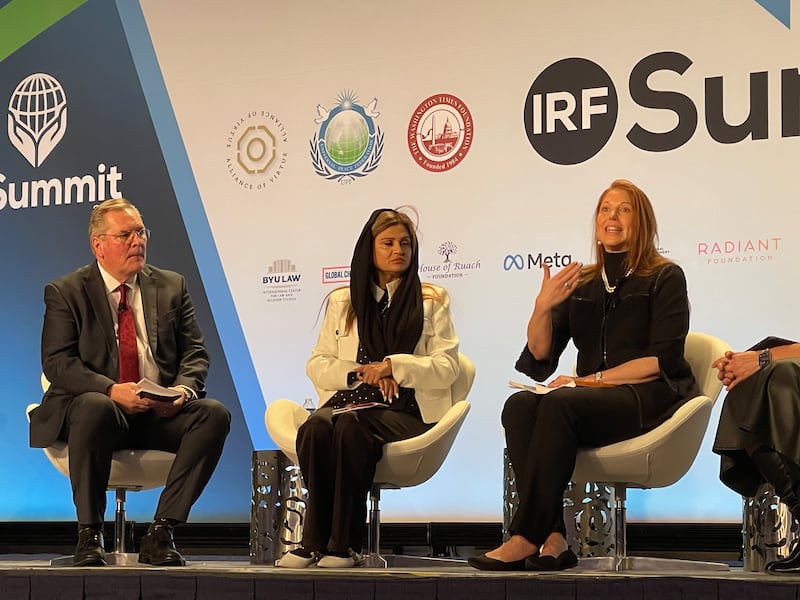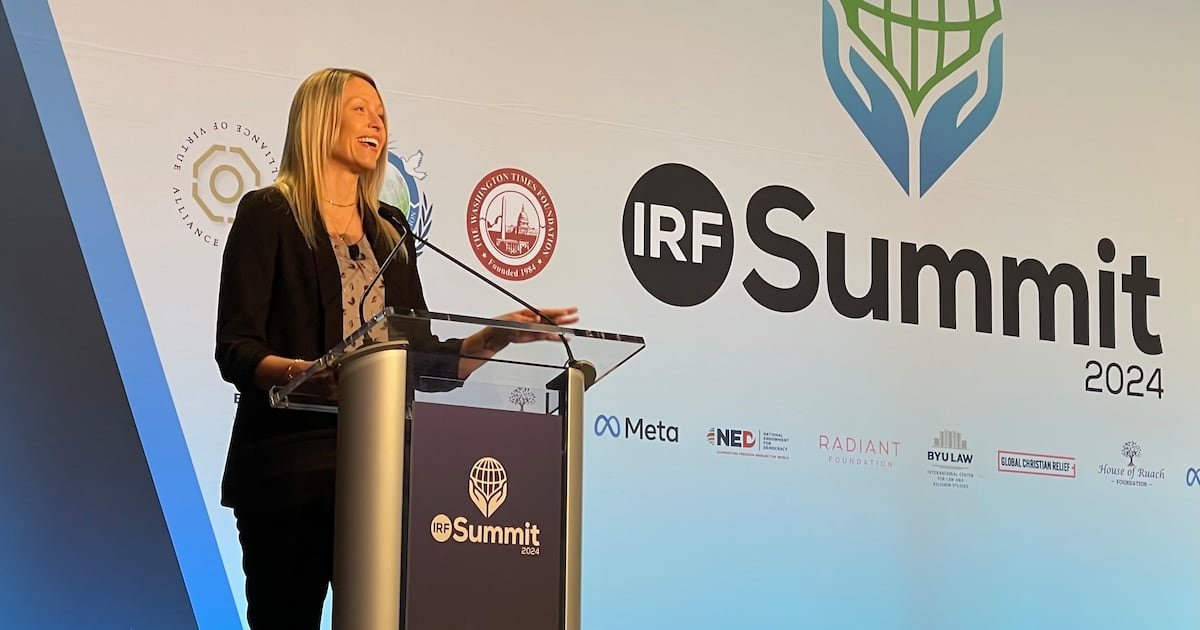Decades’ worth of data collected in a single study published last fall shows that a relationship with God improves mental health and well-being, the study’s authors said Wednesday at the Fourth International Religious Freedom Summit in Washington, DC.
Gallup and the Radiant Foundation reviewed Gallup’s decades of surveys of tens of thousands of people in 140 countries and more than 400 validated research studies and found measurable evidence that religion and spirituality have positive effects.
“A relationship with God is healing,” says Angela Redding, executive director of the Radiant Foundation. “All the research we’ve seen suggests that if you have a relationship with God, you have lower suicide rates, you have less depression and anxiety.”
Organizers of the IRF summit said the event was aimed at advancing the human rights movement in support of international religious freedom. Redding and other speakers at the summit said data shows a global link between spirituality and well-being.
Ilana Ron Levy, managing director of public sector consulting at Gallup, said there’s a mountain of evidence that religion and spirituality provide measurable benefits.
But the number of Americans who say religion is an important part of their daily lives has fallen from 59% in 1999 to 46% in 2022, according to a Gallup poll.
So, what’s going on here?
“If religion and spirituality provide quantifiable benefits to people’s well-being and mental health, why are people turning away from religion?” said Ron Levy.
Studies on religion and mental health
Redding said further research could provide some answers. Religion and spirituality have a perception problem: Religion is increasingly seen as divisive at the very time that the data shows it is bringing healing.
The Radiant Foundation participated in an AI-powered study of over 30 million pieces of content and found that 63% of faith-related content was polemical, with a further 11% being of an extremist nature, such as hate speech.
“That means three-quarters of our media and entertainment does not represent what we all know to be true: that religion and faith are noble, personal, lived experiences,” Redding said at the IRF summit. “Instead, what we see is politicized, divisive, sensationalized and stereotyped.”
She said that while research shows that 84 percent of humanity is involved in religion or spirituality, more than half of those surveyed said the media actively ignores religion as an aspect of society and culture.
“You wouldn’t know that from looking at how people of faith and religion are portrayed in the popular media,” Redding said.
According to data compiled by Gallup and the Radiant Foundation, spirituality helps or reduces the rate of people suffering from mental health issues such as depression, anxiety, and suicide.
For example, the researchers identified 444 studies conducted since the early 1960s that empirically examined the relationship between spirituality and well-being, Ron Levy said.
“What we saw was that 61 percent of these studies found an inverse correlation between depression and religiosity,” she said.
Only 6% of these studies suggested the opposite.
“This is another empirical indication and evidence that there is a strong link between well-being and the mental health benefits of religiosity,” said Ron Levy.
Research has found that spirituality impacts well-being in five important ways.
- First, it brings positive purpose and coping mechanisms into your life.
- Second, it promotes faith-based social connections.
- Third, it promotes community and civic engagement.
- Fourth, it adds structural stability.
- And fifth, it can strengthen a work environment that seeks to support employees’ overall well-being.
Redding said Skylight, a health app developed by the Radiant Foundation, provides additional data.
“We recorded almost 10 million spiritual practices from 4 million unique users,” she said, “and we saw that anxiety scores went down and sleep scores went up.”
She said the data shows both correlation and causation.
“Our global community is seeking common healing,” Redding said, “and we have the power to change the narrative and support people of all faiths in all cultures. My call to all of us today is to work together to bring about peace, human fraternity and tolerance in the world.”
Gathering people together to listen
Deseret News Editor-in-Chief Doug Wilkes moderated a panel of three influential leaders and asked them to respond to the data.
“It reaffirms my belief that faith is something we can hold on to and help us through difficult times,” said Anila Ali, president and CEO of the American Muslim Interfaith Women’s Empowerment Council.

Ali also suggested that adults should help young Americans have more conversations.
“They’re not losing their faith, they’re questioning their faith,” she said. “We feel we can be a better example and come together and show them that religion doesn’t bring division, it finds solutions.”
Rev. Diana Gershon also saw the findings as positive, saying that when talking to young people, adults need to listen twice as much as they talk. She recalled asking her grandmother why she kept ham on a paper plate on a separate shelf, even though she was Jewish.
“The kids in the neighborhood love ham and cheese sandwiches, so I want them to feel at home at my table,” her grandmother said.
“I think about that,” said Rabbi Gerson, a member of the New York Rabbinical Association. “Can we sit at each other’s tables? Can we break bread together? So when (young people) come to us and ask for something, listen.”

Nicole Sterling said she personally found help with her own health through her spirituality when her daughter struggled with mental health issues.
“I wanted to give her some peace of mind, and as I looked at the many needs around the world, I saw a common pattern and theme: people who look to a higher power than themselves feel a sense of community and can come together to accelerate the good that they can do,” said Sterling, who is vice president, chief relationship officer and founding trustee of the Sterling Foundation.
Gallup and Radiant research shows that when people share their spirituality and beliefs, it energizes the entire community, she said.
“So if there’s one important thing I want to share with you, it’s that faith is at the core of my being. It’s why I do what I do. It’s why I spend my time helping others.”

